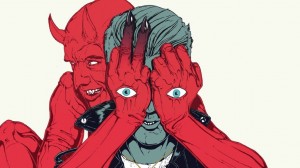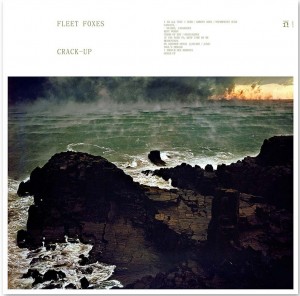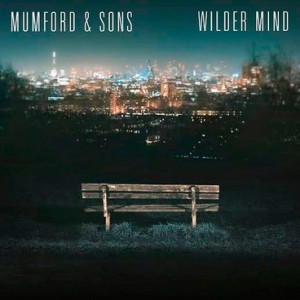Villains Triumphs for Queens of the Stone Age
September 27, 2017
I’ve been a casual Queens of the Stone Age fan since the seventh grade, when their video for “Sick, Sick, Sick” gave me nightmares. They’re the kind of band I keep forgetting about and then coming back to, like an old t-shirt from high school that somehow still fits. In truth, I don’t know much about the band’s members other than lead singer Josh Homme, who, according to a friend who met him, is “super tall and smells good.” So naturally, I didn’t actually know about the impending release of their latest album, Villains, until about a week before it dropped on August 25th.
Honestly, it’s the kind of album I would have picked up out of curiosity anyway—the cover art is like a fever dream straight from the mind of my 17-year-old self. It features a classic red devil on the back of a leather jacket-wearing man who looks a lot like a certain tall, good-smelling lead singer. Maybe I’m shallow—in fact I know I’m shallow—but that’s enough to sell me.
Luckily the band has more to offer than just cover art. The record begins with “Feet Don’t Fail Me,” a track that opens up with a two-minute-long melodic intro that sounds like a mixture of early Cure and late Sisters of Mercy, before jumping into a 70’s-esque dance track. It’s got that classic frenetic, noisy element Queens of the Stone Age is famous for, and it does its job of pacing you for what’s to come.
Track two, “The Way You Used To,” sounds like the kind of song that gets pumped out of the touristy clubs in downtown Nashville, and I mean that in the best way possible. It’s another dancy song, with lyrics that harken all the way back to Hank Williams’ “Why Don’t You Love Me.”
By far, my personal favorite track is “Head like a Haunted House,” which sounds, fittingly, a lot like the soundtrack to an old Scooby-Doo cartoon. It also utilizes a whistle effect similar to the one used in “I’m Designer” off the band’s 2007 album, Era Vulgaris.
Even if I had purchased this album solely for the cover art, it would have been worth it. Villains is a triumphant return for an excellent band—not too shabby for an eighth album. It’s not revolutionary, but not every album has to be, and its unpretentious “let’s get down to it” sound serves it well. - Hannah Barger
Everything Now is Arcade Fire doing everything bland
August 9, 2017
In Pitchfork’s pan of the new Arcade Fire record, they referred to the music as “Banksy rock,” and I can’t say I completely disagree. Much like the work of the famed graffiti artist, Arcade Fire is often way too on the nose for my taste. Their marketing campaigns and concert etiquette are needlessly pretentious at worst, but for the past several years, the band has made up for this with its breathtaking music. Funeral and Neon Bible were masterpieces in my opinion, and even Reflektor had its moments.
That being said, the Montreal-based group’s latest album Everything Now falls flat when compared to previous offerings. I know it isn’t fair to compare a band’s latest work to its past, but realistically, it’s going to happen. The first “full length” track (preceded by a 45 second clip), also titled Everything Now, reminds me way too much of the bland elevator music that corporate played at the TJ Maxx I worked at in high school. A more seasoned fan might say that’s intentional, but what good is music if it’s not enjoyable? A recent Spin article talked about them “trolling” fans; that stopped being funny or original ten years ago, if you ask me.
To be fair, it’s in no way BAD music, just bland. Which in my opinion is nearly worse. The following track, Signs of Life, fares somewhat better in terms of sound. It’s a good song to dance to in the same vein as Porno off the Reflektor album. Still, lyrically, I find it lacking.
Indeed, the lyrics are the biggest issue we should take with this album. Arcade Fire has always been topical, but the words to Infinite Content sound less like “one of us” fighting North American imperialism and excess, and more like someone’s obnoxious older brother who drinks craft beer and whines about technology while reading Vice articles on his phone. “Infinite content, infinite content, we’re infinitely content” sung in a smug, distorted voice? No thank you, Win Butler, I get enough pseudo-philosophy from the nineteen year olds in my ethics class.
In a word, I would call Everything Now disappointing. For a band like Arcade Fire, one that can comfortably call itself iconic, this album will go down in my book as a bad chapter in a long line of hits. And it’s entirely possible I just don’t get it. -Hannah Barger
Fleet Foxes’ Summertime Soundtrack
July 26, 2017
I brought my own assumptions before discovering the Fleet Foxes gorgeous folk-rock comeback album. Lots of college students dream about dropping-out for rock ‘n’ roll, but this band’s frontman dreamed about college and dropped-out of rock n roll to pursue it. That idea alone helped undo my preconceptions.
I knew that they get played in Starbucks and Urban Outfitters, and I once dated a guy who wouldn’t shut up about them (that relationship ended sooner than this album’s time stamp). Forgive me, but I first thought they’d be pretentious and boring, the very kind of music a guy you meet on Tinder would listen to. I’ve been wrong before, though, and I was wrong about this band.
The Seattle-based group’s latest album Crack-Up exceeded my expectations. To compare it to musicians I’m more familiar with, it’s a mix both thematically and sound-wise of Tom Waits, the Lumineers, and Bob Dylan. Here’s a brief rundown of some highlights for this listener new to the Foxes’ fold.
By the first few seconds of track one (which I refer to more briefly as “I Am All That I Need,” easier than the impossibly long actual title), I found myself staring at the ceiling and listening intently. It’s a surreal sound, soothing but jarring at the same time. The whisper/shout/whisper style of it reminded me a lot of early Peter Gabriel-era Genesis. It fades almost seamlessly into track two, a song called “Cassius,-” (weird punctuation courtesy of Fleet Foxes). It’s a gentle lullaby-esque sound that doesn’t match its disconcerting lyrics, but that’s a win in my book.
The album’s strongest and most beautiful song “Kept Woman” hearkens back to Led Zeppelin’s “going to California.” It’s soft, slow, and mournful, perfect for long stretches of highway on the way home from the lake, or the ocean beach, but I do live in Tennessee, after all.
I don’t usually like being proven wrong in my gut assumptions, especially not when it comes to music. But when it comes to this album, I’m willing to swallow my pride. I’ve never really had the desire to live on a 1970s commune, but I imagine Fleet Foxes would make the perfect soundtrack for a movie about one. Their music is summertime, coming-of-age and road-trip-worthy, and that’s just what the music world needs now. -Hannah Barger
The Caffeinated Melancholy of I See You
February 2, 2017
Wanting to expand my musical horizons, I decided to give an open minded listen to the new album by The xx and get into the world of indie pop. And now here I am on a rainy afternoon with a new empathy for the existence of my now-cold cup of coffee. And by that I mean, this album I See You has left me chilled, pleasantly bittersweet, but surprisingly no less energized.

This particular mood is most vividly expressed in the lead song “Dangerous,” an excellent paragon of this melancholia. The recurring brass motif and very danceable beat lend to its almost caffeinated energy, while the harmonies and lyrics of Romy Croft (guitar and vocals) and Oliver Sim (bass guitar and vocals) juxtapose this vibe with a more heartbroken, slow sentimentality.
Further into the album, however, I just couldn’t quite follow their artistic sensibilities. While I could fall in love with the instrumental openings and vocal harmonies, the heart and soul of the beat were lost on me. The “danceability” of the album sacrifices the overall mood of the post-heartbreak chillwave that is I See You. But that isn’t to say this more tribal beat and melodic somberness can’t coexist well. For example: the percussive drum beats of “Lips” highlights the anaphora of the following lines, “In my head/ in my veins/ In the way you give and take/ In the way-that you weigh/ On my body, on my brain.” They intertwine exceptionally to turn the chorus into a playfully difficult earworm that sticks with a person.
I See You, the band’s third album since their formation in 2005, carries on their bare bones approach to music as evident in the band’s name and minimalist album art. But the aforementioned simplicity is not without its shortcomings. Namely “Brave for You” and “I Dare You” feel dragged out because of this bare-bones approach. Not to detract from their merit, the minimalism of these songs still convey a surprising amount of emotional influence, but they might be better suited to a 2-3 minute duration time rather than something closer to 4 minutes.
And to comment on the overarching themes of despondency: this album is something meant for cold coffees, for the void-filled expansion of the post-breakup, for the early morning fog of an especially drizzly weekend. It gives the sort of empathy that helps one “ride the tide” of a difficult situation or just exist in the grey. It’s the feeling of sitting on a sofa in a T.V.-lit apartment next to your not-just-a-one-time lover. In short, it’s the perfect album for times that sit justT below emotional neutrality. I will certainly be purchasing the vinyl for those particular days. 7/10. Jesse Filoteo, Contributing Writer
Wilder Mind, Weaker Album
June 11, 2015
If you were momentarily distracted after starting Wilder Mind, the third album from Mumford and Sons, you could be forgiven for a jolt of surprise when Marcus Mumford’s voice emerges after the intro on “Tompkins Square” rather than Ben Gibbard’s. The percussive pace with electric guitar accents that moves this unremarkable song’s narrative about fleeting passion sounds much more like a Death Cab for Cutie production [or Coldplay or U2 –ed] than what we have come to associate with Mumford and Sons.
Notably missing from the album are banjos and any hint of the frenetic folk rock from Sigh No More and Babel. With two albums under their belt, Mumford and Sons had a distinctive sound; a jangly amalgamation of backwoods bluegrass meets the evangelistic bombast of a street corner Salvation Army band.
In the first two albums, the dizzying pace of the acoustic cacophony seemed temporarily bound together by a tenuous rhythm that could careen into chaos at any moment. These albums teemed with life. In fact, the band seemed to play as if their very lives depended on it, as if our lives depended on it. That virile recklessness is missing from Wilder Mind.
This doesn’t make Wilder Mind a bad album. It is different in significant ways. The songs are various meditations on the mystery of relationships, some disappointingly formulaic (“Tompkins Square” and “Just Smoke”) while others more insightful into the complexities of negotiating one’s self-interest with vulnerability to another (“Snake Eyes” and “Cold Arms”). Disconnection and doubt haunt these songs like they haunt our fragile human couplings. This is where the perhaps unintentional rhythmic similarity of “Tompkins Square” to Death Cab hits like “Soul Meets Body” hurts Wilder Mind. The songs are solid overall but lack the descriptive vulnerability of albums pondering similar themes.
There are hints of what propelled the Mumfords first two albums and formed a passionate following. The third track on the album, “The Wolf,” has flashes of the previous albums but is tightly and meticulously produced. It incites no fear that the music will escape the boundaries of its production. Fans transfixed by the honest engagement with religious themes of grace and doubt in the early albums will appreciate the track “Only Love” with its themes of hunger and thirst and the promise to come in the seeming elusiveness of love—with both the lower and upper case L.
The question of how to assess the album hinges on how such a question is contextualized. Is it a success or a disappointment? A departure or an evolution? Taken on its own, as if the previous albums hadn’t existed, Wilder Mind is a solid, tightly produced, and overall pleasant listening experience. It is a good album that rewards several listens. But it is not great and, as mentioned, its themes and tones have been done better by other bands.
Is it a disappointment? That depends on how we answer the question of the artist vis a vis entertainer. It is necessary for the artist to risk and venture out to honor creativity and vibrancy. The expectations of fans conversely can express a desire for an artist to stay in the mode where the glow of our first love for them was illuminated. A Springsteen may have arrested our attention by capturing the restless angst of young people stuck in an economically and imaginatively depressed town, but is it fair to expect him to channel this into late middle age?
For bands to move beyond our expectations seems like a broken promise, a rupture in our relationship. Ironically, these themes of individuals who grow apart but stay together are explored in several of the songs in this album. We are in a relationship with the bands we love and those mirror all other human relationships. When the Mumfords went electric, it lacked the seismic shock of Dylan doing the same five decades ago. That mere voltage means a sound more “meh” than the veracity of their folked-up first two outings says a lot about the world we live in and why the new pop-folk revival remains strong.
Hopefully, the experimentation of Wilder Mind is a creative detour that leads to a wider mind for the band’s future. In the short term, this may not feel like a step forward, but if the departure from the previous road leads to new vistas of creativity in the future then it could prove valuable as a piece of the artists’ ouevre. As a selected piece of entertainment viewed on its own, it is unremarkable. “I Will Wait” and see. What about you? — Rick Quinn @apophatic1








Recent Comments